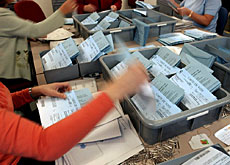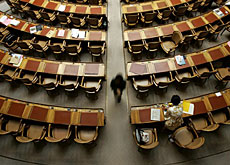
Integration concerns voters in election year

The Swiss People's Party, which has campaigned for tougher laws on asylum and foreigners, remains the most popular with voters nine months before federal elections.
An election barometer by the gfs.bern polling institute indicates that the rightwing party would take 27 per cent of the vote if elections were held now.
The poll, carried out on behalf of the Swiss Broadcasting Corporation – swissinfo’s parent company – shows no major change in support for the main political parties since the last such poll carried out in October. It confirms the advance of the Greens – a key finding of the last voter survey.
But Claude Longchamp, who heads gfs.bern, said there had been a marked change in voters’ concerns since the last poll – when domestic issues including unemployment, taxes and social security were uppermost in people’s minds.
“The matters of concern to voters are very different now to what they were last autumn,” Longchamp told swissinfo. “The electorate is now much more focused on the question of the integration of foreigners.”
In September the Swiss approved tougher regulations on asylum and limited immigration for foreigners from outside the European Union. Justice Minister Christoph Blocher – who represents the People’s Party – was at the forefront of the reform.
Ups and downs
Friday’s gfs poll showed the centre-left Social Democrats in second place with 23 per cent – virtually unchanged from their position in the 2003 elections.
In third position were the centre-right Radicals with 16.1 per cent – better than the 15.5 per cent they garnered in the October poll, but well below the 17.3 per cent they recorded in the 2003 elections.
“The Radicals have lost out in the middle ground and haven’t won voters from the right,” commented Longchamp. He said the party had been overshadowed by the strong People’s Party – which won a second government seat in 2003 – and had lost voters’ sympathy.
The centre-right Christian Democrats, with 14.9 per cent, were the fourth-biggest party.
Longchamp told swissinfo they had managed to capture more of the middle ground, and had increased in popularity with young voters, aged 18 to 39.
The survey also showed increased support for the Greens since 2003. Support was at nine per cent, compared with 7.4 per cent at the last elections.
swissinfo

More
gfs.bern
Elections to the 200-member House of Representatives and for 43 of the 46 seats in the Senate are scheduled for October 21.
The new parliament will elect the seven-member cabinet in December.
The four main political parties currently account for 222 of the 246 seats in both parliamentary chambers.
A government party is a party with at least one seat in the Swiss seven-strong government.
Since 1959 the parties have been: Christian Democrats, Social Democrats, Radical Party and Swiss People’s Party.
Until 2003 all the parties except the People’s Party had two seats (magic formula). The People’s Party then won a second seat at the expense of the Christian Democrats, reflecting the fact it had become more popular with the electorate.
Swiss People’s Party (rightwing, 64 seats): an additional 100,000 votes.
Social Democratic Party (centre-left, 61 seats): to become the biggest party in parliament at the expense of the People’s Party.
Radical Party (centre-right, 54 seats): an additional six seats, in alliance with the Liberal Party.
Christian Democratic Party (centre-right, 43 seats): to remain the largest group in the Senate and win extra seats in the House of Representatives.
Green Party (14 seats): to win more seats in the House and make it into the Senate for the first time.

In compliance with the JTI standards
More: SWI swissinfo.ch certified by the Journalism Trust Initiative




































You can find an overview of ongoing debates with our journalists here . Please join us!
If you want to start a conversation about a topic raised in this article or want to report factual errors, email us at english@swissinfo.ch.